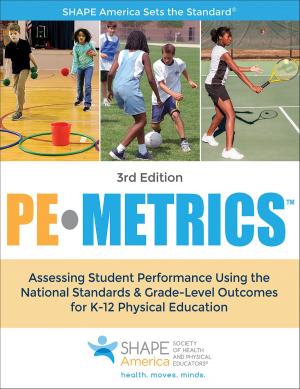Research Methods and Design in Sport Management
Nonfiction, Sports, Reference, Business & Finance, Industries & Professions, Industries| Author: | Damon P.S. Andrew, Paul M. Pedersen | ISBN: | 9781492584056 |
| Publisher: | Human Kinetics, Inc. | Publication: | November 15, 2018 |
| Imprint: | Human Kinetics, Inc. | Language: | English |
| Author: | Damon P.S. Andrew, Paul M. Pedersen |
| ISBN: | 9781492584056 |
| Publisher: | Human Kinetics, Inc. |
| Publication: | November 15, 2018 |
| Imprint: | Human Kinetics, Inc. |
| Language: | English |
Research Methods and Design in Sport Management explains research design, implementation, analysis, and assessment criteria with a focus on specific procedures unique to the discipline of sport management. The text is an invaluable resource for students and practitioners in sport management because it focuses on applied research for organizational purposes and the qualitative and quantitative methodologies pertinent to the field of sport management.
Organized in four parts, Research Methods and Design in Sport Management begins with an introduction to concepts in sport management research and a discussion of the ethical issues associated with research projects. The text outlines the steps to the research process, making it an easy-to-use guide for professionals undertaking a research project as well as students writing major term papers, theses, or dissertations. Analysis of research design with discussion of specific methods used in qualitative, quantitative, and mixed-methods research helps readers to determine and design the most appropriate research for their specific needs. This text teaches readers the following concepts and skills:
•How to conduct a thorough literature review
•Theoretical and conceptual frameworks to guide the research process
•How to develop appropriate research questions and hypotheses
•Techniques for conducting qualitative, quantitative, and mixed-methods research
•Methods for analyzing data and reporting results
Multiple special elements in each chapter, including learning objectives, summaries, suggested advanced readings, and highlight boxes, guide readers through challenging concepts. A chapter dedicated to legal research in sport management provides a nonintimidating discussion of the unique elements evident in sport law research, such as legal precedence, case briefing, and special writing elements. Examples of published research in sport management illustrate ways in which various methodological tools and techniques can be used in answering research questions. Research in Action sections present excerpts from the Journal of Sport Management, which highlight research components mentioned in the text and assist students in learning how to read and evaluate research. In addition, all research examples provided throughout the text are specific to sport management, considering both sport industry settings and academic environments.
Research Methods and Design in Sport Management offers readers the tools to engage in the broad spectrum of research opportunities in the growing discipline of sport management. As accreditation in sport management becomes more prevalent, Research Methods and Design in Sport Management can assist students in gaining the knowledge and skills they need in order to compete in the job market and to contribute to their future careers. For professionals, the text offers tools to ensure the research they conduct and consume can accurately inform strategic business decisions.
Research Methods and Design in Sport Management explains research design, implementation, analysis, and assessment criteria with a focus on specific procedures unique to the discipline of sport management. The text is an invaluable resource for students and practitioners in sport management because it focuses on applied research for organizational purposes and the qualitative and quantitative methodologies pertinent to the field of sport management.
Organized in four parts, Research Methods and Design in Sport Management begins with an introduction to concepts in sport management research and a discussion of the ethical issues associated with research projects. The text outlines the steps to the research process, making it an easy-to-use guide for professionals undertaking a research project as well as students writing major term papers, theses, or dissertations. Analysis of research design with discussion of specific methods used in qualitative, quantitative, and mixed-methods research helps readers to determine and design the most appropriate research for their specific needs. This text teaches readers the following concepts and skills:
•How to conduct a thorough literature review
•Theoretical and conceptual frameworks to guide the research process
•How to develop appropriate research questions and hypotheses
•Techniques for conducting qualitative, quantitative, and mixed-methods research
•Methods for analyzing data and reporting results
Multiple special elements in each chapter, including learning objectives, summaries, suggested advanced readings, and highlight boxes, guide readers through challenging concepts. A chapter dedicated to legal research in sport management provides a nonintimidating discussion of the unique elements evident in sport law research, such as legal precedence, case briefing, and special writing elements. Examples of published research in sport management illustrate ways in which various methodological tools and techniques can be used in answering research questions. Research in Action sections present excerpts from the Journal of Sport Management, which highlight research components mentioned in the text and assist students in learning how to read and evaluate research. In addition, all research examples provided throughout the text are specific to sport management, considering both sport industry settings and academic environments.
Research Methods and Design in Sport Management offers readers the tools to engage in the broad spectrum of research opportunities in the growing discipline of sport management. As accreditation in sport management becomes more prevalent, Research Methods and Design in Sport Management can assist students in gaining the knowledge and skills they need in order to compete in the job market and to contribute to their future careers. For professionals, the text offers tools to ensure the research they conduct and consume can accurately inform strategic business decisions.















